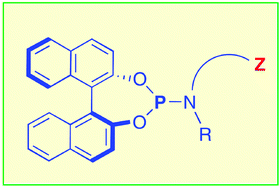BINOL-derived phosphoramidites in asymmetric hydrogenation: can the presence of a functionality in the amino group influence the catalytic outcome?
Abstract
In discovering the remarkable catalytic properties of BINOL-derived

a Laboratoire de Chimie Inorganique Moléculaire, Institut de Chimie, UMR 7177 CNRS-Université Louis Pasteur, 1 rue Blaise Pascal, F-67008, France
b ISIS, UMR 7006 CNRS-ULP, 8 allée Gaspard Monge, BP 70028, France
In discovering the remarkable catalytic properties of BINOL-derived

 Please wait while we load your content...
Something went wrong. Try again?
Please wait while we load your content...
Something went wrong. Try again?
L. Eberhardt, D. Armspach, J. Harrowfield and D. Matt, Chem. Soc. Rev., 2008, 37, 839 DOI: 10.1039/B714519E
To request permission to reproduce material from this article, please go to the Copyright Clearance Center request page.
If you are an author contributing to an RSC publication, you do not need to request permission provided correct acknowledgement is given.
If you are the author of this article, you do not need to request permission to reproduce figures and diagrams provided correct acknowledgement is given. If you want to reproduce the whole article in a third-party publication (excluding your thesis/dissertation for which permission is not required) please go to the Copyright Clearance Center request page.
Read more about how to correctly acknowledge RSC content.
 Fetching data from CrossRef.
Fetching data from CrossRef.
This may take some time to load.
Loading related content
